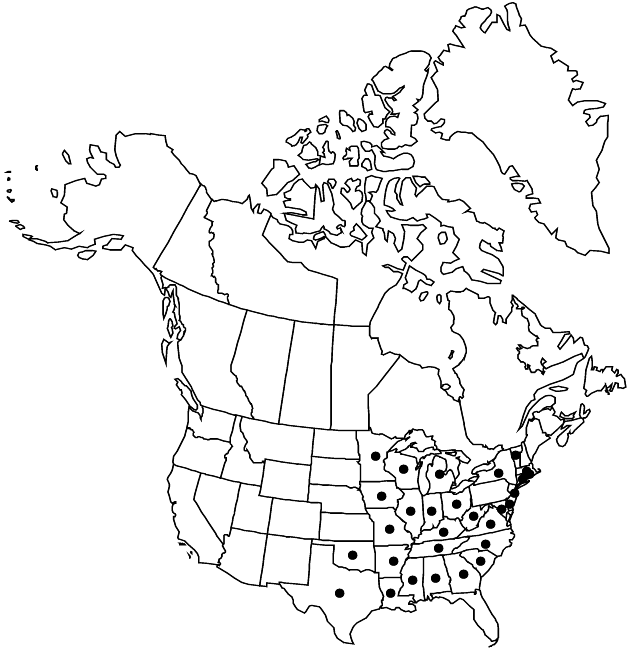Difference between revisions of "Solidago speciosa var. speciosa"
FNA>Volume Importer |
FNA>Volume Importer |
||
| Line 34: | Line 34: | ||
|elevation=0–800+ m | |elevation=0–800+ m | ||
|distribution=Ala.;Ark.;Conn.;Del.;Ga.;Ill.;Ind.;Iowa;Ky.;La.;Md.;Mass.;Mich.;Minn.;Miss.;Mo.;N.J.;N.Y.;N.C.;Ohio;Okla.;R.I.;S.C.;Tenn.;Tex.;Vt.;Va.;W.Va.;Wis. | |distribution=Ala.;Ark.;Conn.;Del.;Ga.;Ill.;Ind.;Iowa;Ky.;La.;Md.;Mass.;Mich.;Minn.;Miss.;Mo.;N.J.;N.Y.;N.C.;Ohio;Okla.;R.I.;S.C.;Tenn.;Tex.;Vt.;Va.;W.Va.;Wis. | ||
| − | |discussion=<p>Variety speciosa is the tall, robust, broad-leaved race of the species occurring throughout much of the range. Relatively few-leaved plants with more open paniculiform arrays from Illinois, Indiana, Michigan, Minnesota, and Wisconsin have been treated as var. jejunifolia; the status of that variety is uncertain and it may deserve recognition. Some specimens that have been assigned to var. jejunifolia are either typical <i>S. uliginosa</i> or possibly hybrids with that species. Narrower-leaved plants have been treated as <i></i>var.<i> angustata</i>; the type material comes from eastern states, but the name has been misapplied to plants of <i></i>var.<i> rigidiuscula</i> (with persistent narrow basal leaves) from the prairies and prairielike habitats along the western edge of the eastern deciduous forest in the United States (M. L. Fernald 1950).</p> | + | |discussion=<p>Variety speciosa is the tall, robust, broad-leaved race of the species occurring throughout much of the range. Relatively few-leaved plants with more open paniculiform arrays from Illinois, Indiana, Michigan, Minnesota, and Wisconsin have been treated as var. jejunifolia; the status of that variety is uncertain and it may deserve recognition. Some specimens that have been assigned to var. jejunifolia are either typical <i>S. uliginosa</i> or possibly hybrids with that species. Narrower-leaved plants have been treated as <i></i></i>var.<i><i> angustata</i>; the type material comes from eastern states, but the name has been misapplied to plants of <i></i></i>var.<i><i> rigidiuscula</i> (with persistent narrow basal leaves) from the prairies and prairielike habitats along the western edge of the eastern deciduous forest in the United States (M. L. Fernald 1950).</p> |
|tables= | |tables= | ||
|references= | |references= | ||
| Line 58: | Line 58: | ||
|publication year= | |publication year= | ||
|special status= | |special status= | ||
| − | |source xml=https://jpend@bitbucket.org/aafc-mbb/fna-data-curation.git/src/ | + | |source xml=https://jpend@bitbucket.org/aafc-mbb/fna-data-curation.git/src/f6b125a955440c0872999024f038d74684f65921/coarse_grained_fna_xml/V19-20-21/V20_247.xml |
|tribe=Asteraceae tribe Astereae | |tribe=Asteraceae tribe Astereae | ||
|genus=Solidago | |genus=Solidago | ||
Revision as of 18:42, 24 September 2019
Leaves: basal usually persistent at flowering, (20–)28–55 mm wide, often coarsely serrate; mid cauline usually (10–)20–28 mm wide, not crowded, not stiff, not scabrous. 2n = 18, 36, 54.
Phenology: Flowering Sep–Oct.
Habitat: Sandy and gravelly soils, open woods, fields, roadsides
Elevation: 0–800+ m
Distribution

Ala., Ark., Conn., Del., Ga., Ill., Ind., Iowa, Ky., La., Md., Mass., Mich., Minn., Miss., Mo., N.J., N.Y., N.C., Ohio, Okla., R.I., S.C., Tenn., Tex., Vt., Va., W.Va., Wis.
Discussion
Variety speciosa is the tall, robust, broad-leaved race of the species occurring throughout much of the range. Relatively few-leaved plants with more open paniculiform arrays from Illinois, Indiana, Michigan, Minnesota, and Wisconsin have been treated as var. jejunifolia; the status of that variety is uncertain and it may deserve recognition. Some specimens that have been assigned to var. jejunifolia are either typical S. uliginosa or possibly hybrids with that species. Narrower-leaved plants have been treated as var. angustata; the type material comes from eastern states, but the name has been misapplied to plants of var. rigidiuscula (with persistent narrow basal leaves) from the prairies and prairielike habitats along the western edge of the eastern deciduous forest in the United States (M. L. Fernald 1950).
Selected References
None.